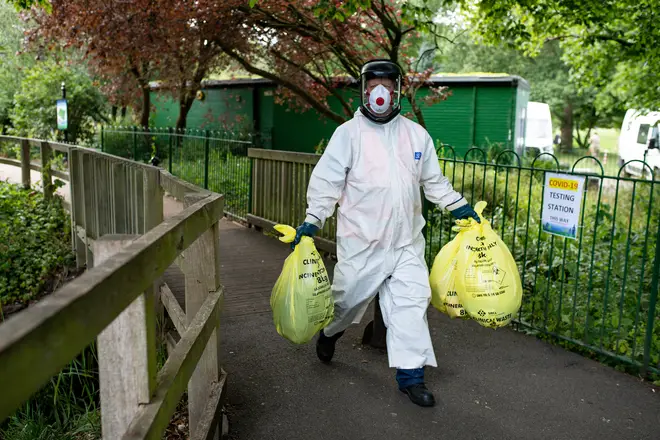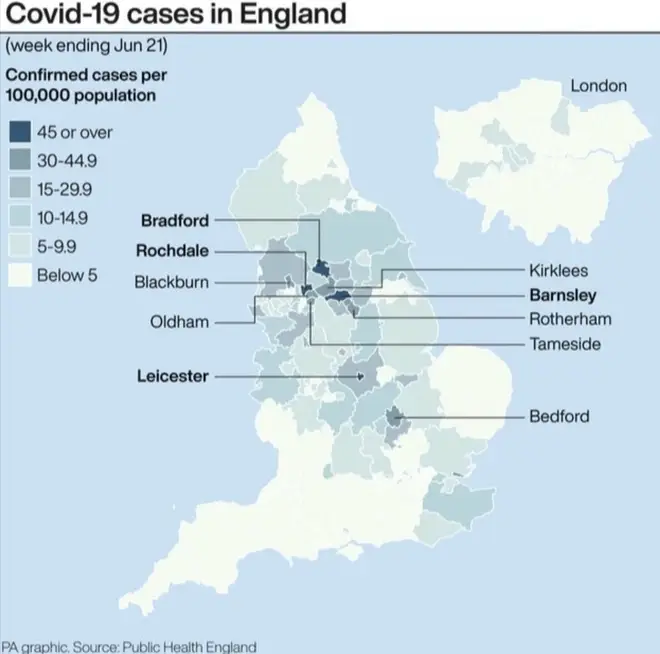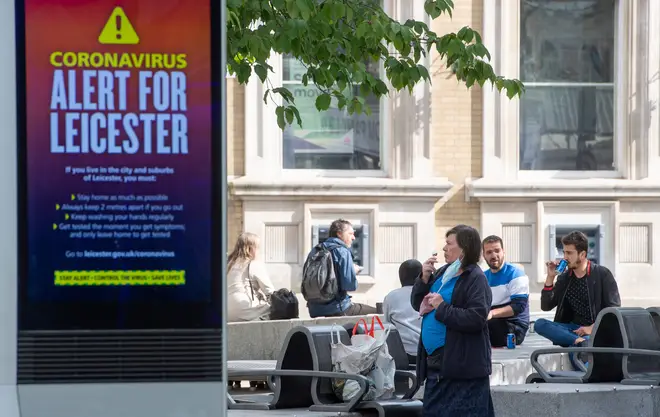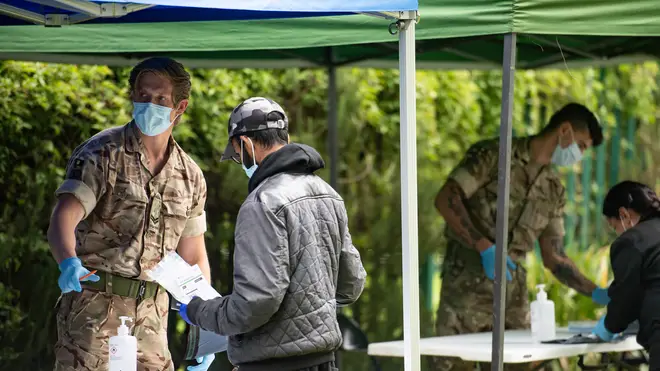
Ian Payne 4am - 7am
1 July 2020, 14:54

Barnsley has called for its residents to show "extra vigilance" in following coronavirus rules after data showed their cases of Covid-19 are "higher than the national average".
Figures suggest Barnsley, Rochdale and Bradford could be the next regions to go into a local lockdown.
A key scientist in the coronavirus response warned Bradford, as well as Doncaster, are "clearly of concern", with high rates of coronavirus.
Imperial College London's Professor Neil Ferguson, who used to advise the Government, said: "Those are areas, where not as high as Leicester, but they have some of the highest numbers of cases per 100,000 of the population, which is the relevant measure, so they're clearly of concern."

But Barnsley Council has denied these claims, saying the larger than average numbers are due to an elderly population and large populations living inside care homes.
In a statement released on Twitter, the council said: "The good news is that now these clusters have started to ease thanks to local control measures, and we are seeing the early signs of a return to the reduction in daily cases across Barnsley".
The spokesperson added: "This is why we do not believe at this stage any further measures will need to be implemented such as the ones seen in Leicester.
PLEASE SHARE - Barnsley is not currently at risk of going into a further lockdown.
— Barnsley Council (@BarnsleyCouncil) July 1, 2020
We know the amount of positive Coronavirus (COVID-19) cases might cause concern, but there are many reasons for the numbers - outlined via these images and our statement at https://t.co/TRdps76zCP pic.twitter.com/30gyhVTVI2
"However, it is always important to be aware that the nature of this disease means things can change quickly and the fact our rate has been high does mean that we ask for extra caution and vigilance by everyone in Barnsley."
On Monday evening, Health Secretary Matt Hancock announced Leicester would be the first city to go into a local lockdown following a surge in coronavirus cases.
The government also identified a further 36 areas across the country which could follow in the city's footsteps.
The map shows that the worst affected regions after Leicester (with at least 45 cases per 100,000 people in the week to June 21) Barnsley, Bradford and Rochdale.
There are six areas in the next worst affected category (30-44.9 cases per 100,000), which are Bedford, Blackburn with Darwen, Tameside, Oldham, Kirklees and Rotherham.
Professor Neil Ferguson, from Imperial College London has also warned it is an "illusion" that the UK is past the worst of the Covid-19 epidemic.

Councils "will be supported" in implementing local lockdowns
Prof Ferguson told Radio 4's Today programme the UK the country was "relatively blind" in late February and early March over how much infection there was in the community.
"We were, in retrospect, one of the most heavily seeded countries with infection in Europe," he said.
"I would say, before we make international comparisons though, just bear in mind we are still very early into this pandemic - there's a bit of an illusion out there that somehow we are past the worst.
"In this country we've probably had no more than 8% of the population infected.
"This is far from over, so I think lessons can be learned from what happened in the UK up to now, but I would prefer to focus on getting the next six months right before looking back in earnest.
"It's inevitable we will (have further local outbreaks), we are relaxing lockdown rules and that means that contacts in the population are going up and that's a very variable process."

Prof Ferguson said there is a window of a few weeks to resolve "teething problems" in how data is shared, to have systems up and running for the scheduled full return of schools in September in England.
It comes after the British Medical Association (BMA) said the Government needs to be "more open and transparent with local Covid-19 data" and on how spikes will be dealt with.
Prof Ferguson said: "I think we have not a huge amount of time but a few weeks now to resolve those teething problems and get the data systems in place and get the modes of operation between local and national government working well, because we will desperately need them to work efficiently from September onwards."
He said PHE and others were "doing their best", adding: "It's a very complex system to combine data from multiple sources from across the whole country.
"I don't think we have any time to lose but I'm not going to sit here and start criticising people at the moment."

Mayor of Greater Manchester Andy Burnham said the new PHE data raised questions for the Government.
He tweeted: "The biggest of all is this: why did they give the go ahead for the big re-opening on 4th July when they could clearly see what was happening in Leicester?"
Labour MP Yvette Cooper said health authorities in her constituency in Wakefield, West Yorkshire, had been trying to get hold of pillar two testing data but had not been able to.
She tweeted: "Our local public health teams, council, NHS doctors & managers in Wakefield have had to fight for months to try to get this data.
"In public health crisis, most important thing is knowing where infection is. Appalling & incomprehensible that basic info hasn't been provided.
"The idea this could have been Ministerial choice rather than failure of competence is even more shocking. What on earth is going on?"
Sir Chris Ham, former chief executive of the King's Fund, wrote in the British Medical Journal that the UK could become more like Germany "where regional and local leaders have played a significant role in limiting the impact of Covid-19 on the public's health".
"Local leaders, including devolved governments and elected mayors, are much better placed than the Westminster Government to engage their communities in limiting and responding to future outbreaks," he said.
Listen & subscribe: Global Player | Apple Podcasts | Google Podcasts | Spotify